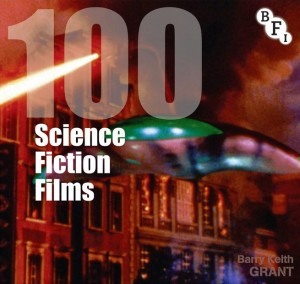100 Science Fiction Films
100 Science Fiction Films by Barry Keith Grant (Palgrave Macmillan / British Film Institute, 2013). 216 pages. ISBN 978-1844574575 (paperback). £16.99
 About the reviewer: James Chapman is Professor of Film Studies at the University of Leicester. He is the author of nine books including The British at War: Cinema, State and Propaganda, 1939-1945 (I.B. Tauris, 1998), Past and Present: National Identity and the British Historical Film (I. B. Tauris, 2005), War and Film (Reaktion, 2008) and Projecting the Future: Science Fiction and Popular Cinema, co-authored with Nicholas J. Cull (IB Tauris, 2012). He is a Council member of IAMHIST and editor of the Historical Journal of Film, Radio and Television.
About the reviewer: James Chapman is Professor of Film Studies at the University of Leicester. He is the author of nine books including The British at War: Cinema, State and Propaganda, 1939-1945 (I.B. Tauris, 1998), Past and Present: National Identity and the British Historical Film (I. B. Tauris, 2005), War and Film (Reaktion, 2008) and Projecting the Future: Science Fiction and Popular Cinema, co-authored with Nicholas J. Cull (IB Tauris, 2012). He is a Council member of IAMHIST and editor of the Historical Journal of Film, Radio and Television.
This entry in the British Film Institute’s ‘Screen Guides’ series is aimed more at the film buff than the academic market, though it may also provide a useful starter text for modules on Science Fiction Cinema at undergraduate level. Barry Keith Grant, Professor of Popular Culture and Film at Brock University, Ontario, is a renowned authority on genre criticism and theory, and has previous ‘form’ both in science fiction film, having written one of the better BFI ‘Film Classics’ on Invasion of the Body Snatchers in 2010, and in this series, as co-author (with Jim Hillier) of 100 Documentary Films (2009).
 The format of the ‘Screen Guides’ series is short summary essays on a hundred key genre films, and much of the interest for the reader (and probably for the author) is in the selection. Most of the landmark science fiction films are represented, including Metropolis (1927), Things to Come (1936), Destination Moon (1950), The Day the Earth Stood Still (1951), Forbidden Planet (1956), The Time Machine (1960), Planet of the Apes (1968), 2001: A Space Odyssey (1968), Star Wars (1977), Close Encounters of the Third Kind (1978), Blade Runner (1982) and Avatar (2009). Grant interprets the meaning of ‘science fiction’ flexibly to include horror/science fiction hybrids such as Frankenstein (1931) and The Invisible Man (1933), and Peter Watkins’s celebrated documentary-drama The War Game (1965), which, although produced for (though initially not shown on) television earns its inclusion here by dint of a cinema release that brought it an Academy Award. There are also a few off-beat inclusions, such as Rene Clair’s Dadaist fantasy Paris qui dort (1925) and Craig Baldwin’s ‘mockumentary’ Tribulation 99: Alien Anomalies Under America (1992), which sounds such weird fun that I shall look forward to seeking it out. The inclusion of Edward D. Wood’s cult classic Plan 9 from Outer Space (1959) – a film that holds the somewhat dubious (and no doubt contested) honour of being the worst of all time – rather contradicts the press release accompanying the book describing it as ‘an indispensable guide to 100 of the best sci-fi films ever made.’
The format of the ‘Screen Guides’ series is short summary essays on a hundred key genre films, and much of the interest for the reader (and probably for the author) is in the selection. Most of the landmark science fiction films are represented, including Metropolis (1927), Things to Come (1936), Destination Moon (1950), The Day the Earth Stood Still (1951), Forbidden Planet (1956), The Time Machine (1960), Planet of the Apes (1968), 2001: A Space Odyssey (1968), Star Wars (1977), Close Encounters of the Third Kind (1978), Blade Runner (1982) and Avatar (2009). Grant interprets the meaning of ‘science fiction’ flexibly to include horror/science fiction hybrids such as Frankenstein (1931) and The Invisible Man (1933), and Peter Watkins’s celebrated documentary-drama The War Game (1965), which, although produced for (though initially not shown on) television earns its inclusion here by dint of a cinema release that brought it an Academy Award. There are also a few off-beat inclusions, such as Rene Clair’s Dadaist fantasy Paris qui dort (1925) and Craig Baldwin’s ‘mockumentary’ Tribulation 99: Alien Anomalies Under America (1992), which sounds such weird fun that I shall look forward to seeking it out. The inclusion of Edward D. Wood’s cult classic Plan 9 from Outer Space (1959) – a film that holds the somewhat dubious (and no doubt contested) honour of being the worst of all time – rather contradicts the press release accompanying the book describing it as ‘an indispensable guide to 100 of the best sci-fi films ever made.’

 Learning on Screen
Learning on Screen